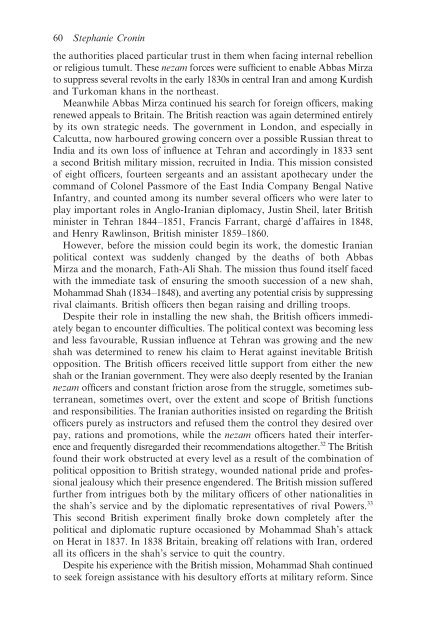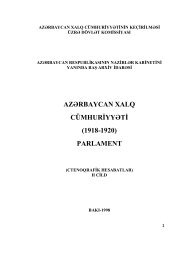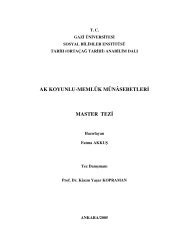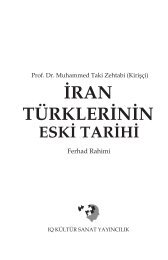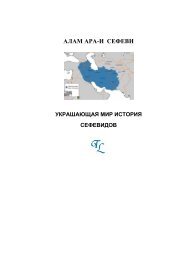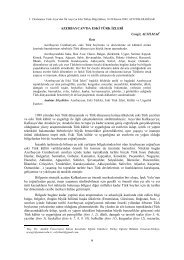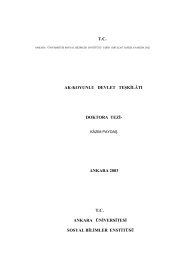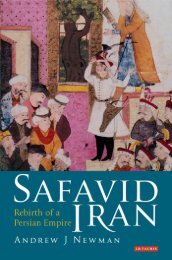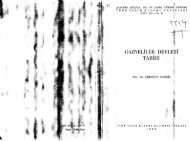War and Peace in Qajar Persia: Implications Past and ... - Oguzlar.az
War and Peace in Qajar Persia: Implications Past and ... - Oguzlar.az
War and Peace in Qajar Persia: Implications Past and ... - Oguzlar.az
- No tags were found...
You also want an ePaper? Increase the reach of your titles
YUMPU automatically turns print PDFs into web optimized ePapers that Google loves.
60 Stephanie Cron<strong>in</strong>the authorities placed particular trust <strong>in</strong> them when fac<strong>in</strong>g <strong>in</strong>ternal rebellionor religious tumult. These nezam forces were sufficient to enable Abbas Mirzato suppress several revolts <strong>in</strong> the early 1830s <strong>in</strong> central Iran <strong>and</strong> among Kurdish<strong>and</strong> Turkoman khans <strong>in</strong> the northeast.Meanwhile Abbas Mirza cont<strong>in</strong>ued his search for foreign officers, mak<strong>in</strong>grenewed appeals to Brita<strong>in</strong>. The British reaction was aga<strong>in</strong> determ<strong>in</strong>ed entirelyby its own strategic needs. The government <strong>in</strong> London, <strong>and</strong> especially <strong>in</strong>Calcutta, now harboured grow<strong>in</strong>g concern over a possible Russian threat toIndia <strong>and</strong> its own loss of <strong>in</strong>fluence at Tehran <strong>and</strong> accord<strong>in</strong>gly <strong>in</strong> 1833 senta second British military mission, recruited <strong>in</strong> India. This mission consistedof eight officers, fourteen sergeants <strong>and</strong> an assistant apothecary under thecomm<strong>and</strong> of Colonel Passmore of the East India Company Bengal NativeInfantry, <strong>and</strong> counted among its number several officers who were later toplay important roles <strong>in</strong> Anglo-Iranian diplomacy, Just<strong>in</strong> Sheil, later Britishm<strong>in</strong>ister <strong>in</strong> Tehran 1844–1851, Francis Farrant, chargé d’affaires <strong>in</strong> 1848,<strong>and</strong> Henry Rawl<strong>in</strong>son, British m<strong>in</strong>ister 1859–1860.However, before the mission could beg<strong>in</strong> its work, the domestic Iranianpolitical context was suddenly changed by the deaths of both AbbasMirza <strong>and</strong> the monarch, Fath-Ali Shah. The mission thus found itself facedwith the immediate task of ensur<strong>in</strong>g the smooth succession of a new shah,Mohammad Shah (1834–1848), <strong>and</strong> avert<strong>in</strong>g any potential crisis by suppress<strong>in</strong>grival claimants. British officers then began rais<strong>in</strong>g <strong>and</strong> drill<strong>in</strong>g troops.Despite their role <strong>in</strong> <strong>in</strong>stall<strong>in</strong>g the new shah, the British officers immediatelybegan to encounter difficulties. The political context was becom<strong>in</strong>g less<strong>and</strong> less favourable, Russian <strong>in</strong>fluence at Tehran was grow<strong>in</strong>g <strong>and</strong> the newshah was determ<strong>in</strong>ed to renew his claim to Herat aga<strong>in</strong>st <strong>in</strong>evitable Britishopposition. The British officers received little support from either the newshah or the Iranian government. They were also deeply resented by the Iraniannezam officers <strong>and</strong> constant friction arose from the struggle, sometimes subterranean,sometimes overt, over the extent <strong>and</strong> scope of British functions<strong>and</strong> responsibilities. The Iranian authorities <strong>in</strong>sisted on regard<strong>in</strong>g the Britishofficers purely as <strong>in</strong>structors <strong>and</strong> refused them the control they desired overpay, rations <strong>and</strong> promotions, while the nezam officers hated their <strong>in</strong>terference<strong>and</strong> frequently disregarded their recommendations altogether. 32 The Britishfound their work obstructed at every level as a result of the comb<strong>in</strong>ation ofpolitical opposition to British strategy, wounded national pride <strong>and</strong> professionaljealousy which their presence engendered. The British mission sufferedfurther from <strong>in</strong>trigues both by the military officers of other nationalities <strong>in</strong>the shah’s service <strong>and</strong> by the diplomatic representatives of rival Powers. 33This second British experiment f<strong>in</strong>ally broke down completely after thepolitical <strong>and</strong> diplomatic rupture occasioned by Mohammad Shah’s attackon Herat <strong>in</strong> 1837. In 1838 Brita<strong>in</strong>, break<strong>in</strong>g off relations with Iran, orderedall its officers <strong>in</strong> the shah’s service to quit the country.Despite his experience with the British mission, Mohammad Shah cont<strong>in</strong>uedto seek foreign assistance with his desultory efforts at military reform. S<strong>in</strong>ce


